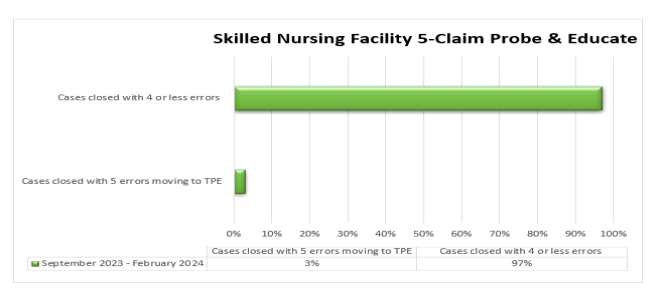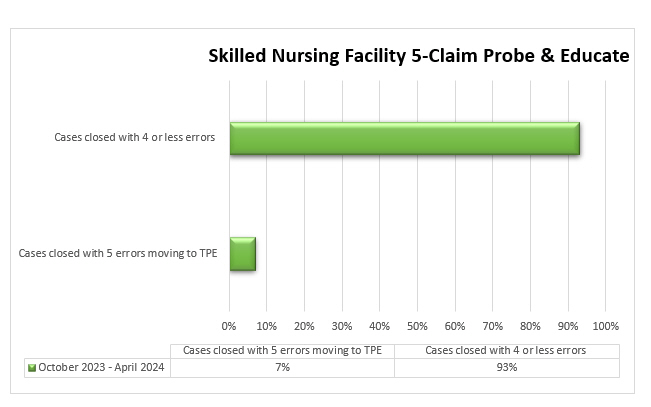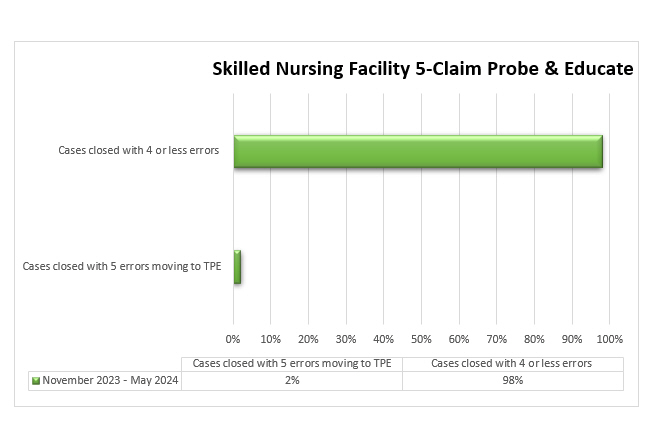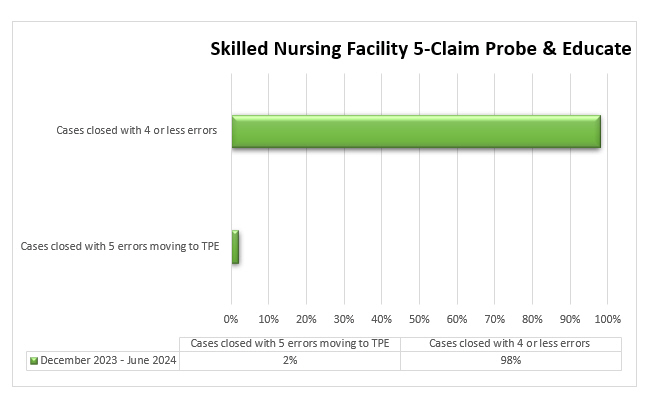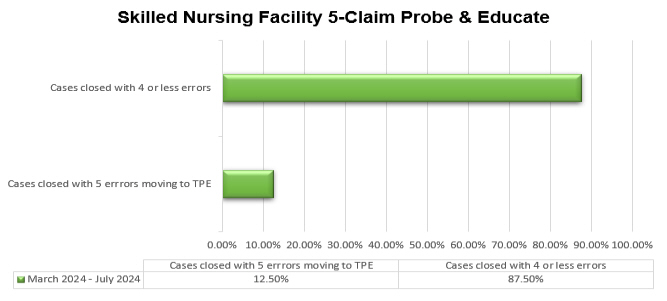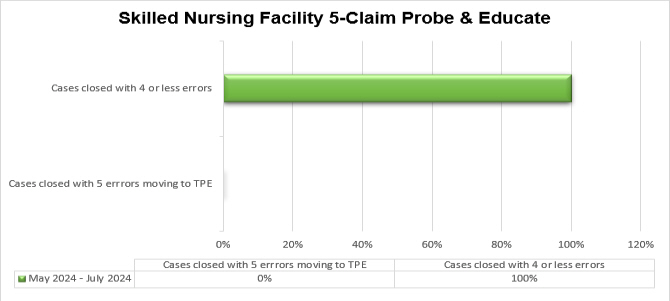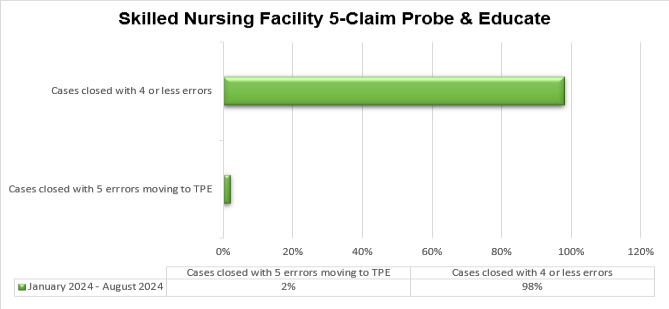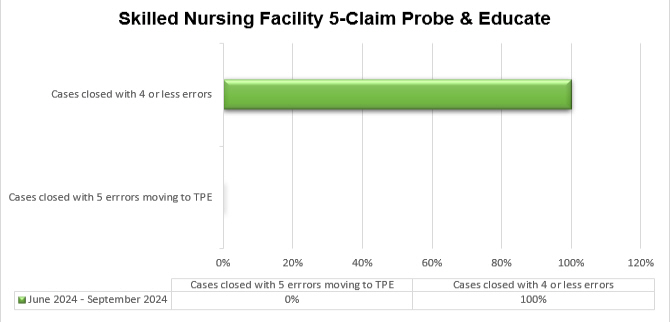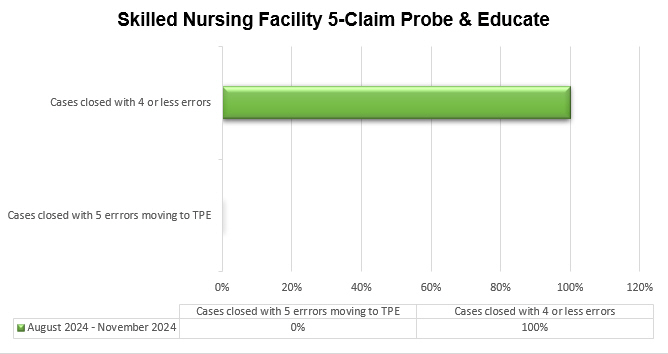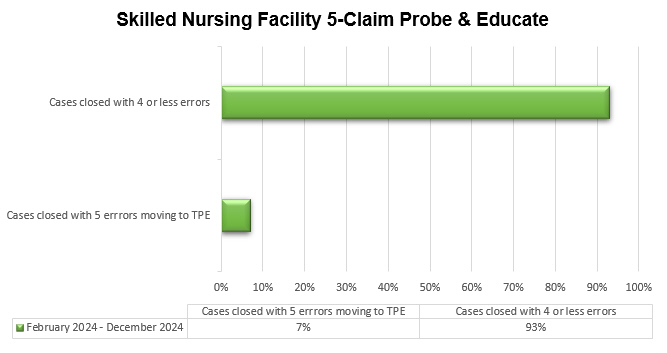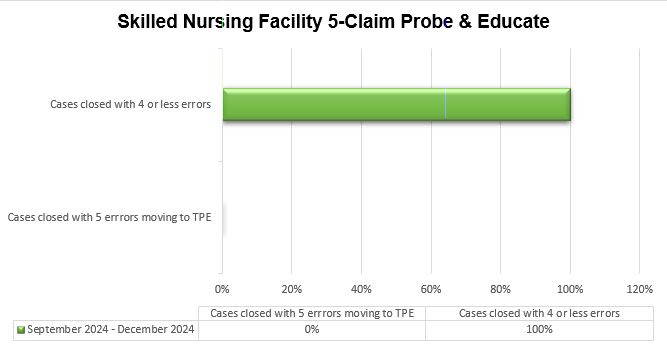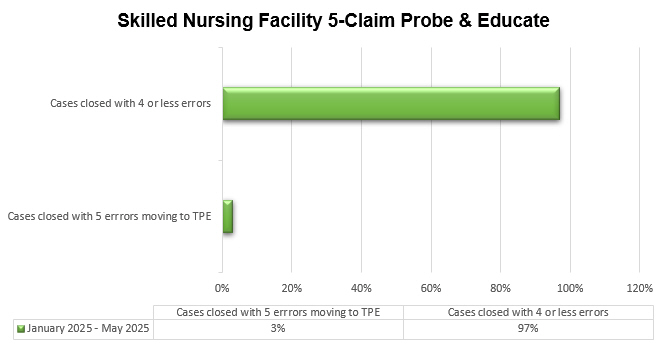Home ►
Medical review ►
Skilled Nursing Facility (SNF) 5-Claim Probe and Educate (PE) Round Results
Last Modified: 6/18/2025
Location: FL, PR, USVI
Business: Part A
Top denial/partial denial reasons and high-level results are listed below from each round of SNF P&E services reviews that have been conducted thus far by Medical Review. If you have questions about your individual results, please contact the nurse reviewer assigned to your review for additional information. Additional rounds of review will be utilized when the targeted topic demonstrates a continued need for review with newly identified providers.
The most common reasons for denial or partial denials are the following:
1. Medical Necessity – The documentation submitted does not support medical necessity as listed in coverage requirements.
2. Insufficient Documentation – Insufficient documentation was provided to support the services as billed to Medicare. Medical Review makes multiple attempts to correct these error types before completion of the review. Below are the following denial reasons for insufficient documentation that we were not able to resolve:
• Documentation submitted for review did not support a 3-day qualifying stay.
• Documentation submitted for review lacked days of coverage due to benefit exhaust.
• Documentation submitted for review lacked a certification or recertification signed timely.
The most common reasons for denial or partial denials are the following:
1. Medical Necessity – The documentation submitted does not support medical necessity as listed in coverage requirements.
3. Insufficient Documentation – Insufficient documentation was provided to support the services as billed to Medicare. Medical Review makes multiple attempts to correct these error types before completion of the review. Below are the following denial reasons for insufficient documentation that we were not able to resolve:
• Documentation submitted for review did not support a 3-day qualifying stay.
• Documentation submitted for review did not support the services billed.
The most common reasons for denial or partial denials are the following:
1. Medical Necessity – The documentation submitted does not support medical necessity as listed in coverage requirements.
4. Insufficient Documentation – Insufficient documentation was provided to support the services as billed to Medicare. Medical Review makes multiple attempts to correct these error types before completion of the review. Below are the following denial reasons for insufficient documentation that we were not able to resolve:
• Documentation submitted for review did not support a 3-day qualifying stay.
• Documentation submitted for review lacked a certification or recertification signed timely.
• Documentation submitted for review did not support the services billed.
• Non-response to documentation request.
The most common reasons for denial or partial denials are the following:
1. Medical Necessity – The documentation submitted does not support medical necessity as listed in coverage requirements.
5. Insufficient Documentation – Insufficient documentation was provided to support the services as billed to Medicare. Medical Review makes multiple attempts to correct these error types before completion of the review. Below are the following denial reasons for insufficient documentation that we were not able to resolve:
• Documentation submitted for review did not support a 3-day qualifying stay.
• Documentation submitted for review did not support the services billed.
The most common reasons for denial or partial denials are the following:
Medical Necessity – The documentation submitted does not support medical necessity as listed in coverage requirements.
Insufficient Documentation – Insufficient documentation was provided to support the services as billed to Medicare. Medical Review makes multiple attempts to correct these error types before completion of the review. Below are the following denial reasons for insufficient documentation that we were not able to resolve:
• Documentation submitted for review did not support a 3-day qualifying stay.
• Documentation submitted for review did not support the services billed.
The most common reasons for denial or partial denials are the following:
1. Medical Necessity – The documentation submitted does not support medical necessity as listed in coverage requirements.
Insufficient Documentation – Insufficient documentation was provided to support the services as billed to Medicare. Medical Review makes multiple attempts to correct these error types before completion of the review. Below are the following denial reasons for insufficient documentation that we were not able to resolve:
• Documentation submitted for review did not support a 3-day qualifying stay.
• Documentation submitted for review lacked days of coverage due to benefit exhaust.
• Documentation submitted for review lacked a certification or recertification signed timely.
• Documentation submitted for review did not support the services billed.
The most common reasons for denial or partial denials are the following:
1. Medical Necessity – The documentation submitted does not support medical necessity as listed in coverage requirements.
Insufficient Documentation – Insufficient documentation was provided to support the services as billed to Medicare. Medical Review makes multiple attempts to correct these error types before completion of the review. Below are the following denial reasons for insufficient documentation that we were not able to resolve:
• Documentation submitted for review did not support a 3-day qualifying stay.
• Documentation submitted for review did not support the services bill\ed.
• Documentation submitted for review did not include the required certification/re-certification for the SNF stay.
The most common reasons for denial or partial denials are the following:
1.
Medical Necessity – The documentation submitted does not support medical necessity as listed in coverage requirements.
Insufficient Documentation – Insufficient documentation was provided to support the services as billed to Medicare. Medical Review makes multiple attempts to correct these error types before completion of the review. Below are the following denial reasons for insufficient documentation that we were not able to resolve:
§ No denials
The most common reasons for denial or partial denials are the following:
1. Medical Necessity – The documentation submitted does not support medical necessity as listed in coverage requirements.
Insufficient Documentation – Insufficient documentation was provided to support the services as billed to Medicare. Medical Review makes multiple attempts to correct these error types before completion of the review. Below are the following denial reasons for insufficient documentation that we were not able to resolve:
a. Documentation submitted for review did not support a 3-day qualifying stay.
b. Documentation submitted for review did not support the services bill\ed.
c. Documentation submitted did not support the HIPPS code submitted to the repository, claim recoded to support the correct service.
d. Documentation submitted did not support the number of days billed, claim reduced to support the correct number of services.
e. Non-response to documentation request.
The most common reasons for denial or partial denials are the following:
1. Medical Necessity – The documentation submitted does not support medical necessity as listed in coverage requirements.
2. Insufficient Documentation – Insufficient documentation was provided to support the services as billed to Medicare. Medical Review makes multiple attempts to correct these error types before completion of the review. Below are the following denial reasons for insufficient documentation that we were not able to resolve:
§ No denials
The most common reasons for denial or partial denials are the following:
1. Medical Necessity – The documentation submitted does not support medical necessity as listed in coverage requirements.
2. Insufficient Documentation – Insufficient documentation was provided to support the services as billed to Medicare. Medical Review makes multiple attempts to correct these error types before completion of the review. Below are the following denial reasons for insufficient documentation that we were not able to resolve:
§ No denials
The most common reasons for denial or partial denials are the following:
1. Medical Necessity – The documentation submitted does not support medical necessity as listed in coverage requirements.
2. Insufficient Documentation – Insufficient documentation was provided to support the services as billed to Medicare. Medical Review makes multiple attempts to correct these error types before completion of the review. Below are the following denial reasons for insufficient documentation that we were not able to resolve:
• Documentation submitted for review did not support the services billed.
• Non-response to documentation requested.
The most common reasons for denial or partial denials are the following:
1. Medical Necessity – The documentation submitted does not support medical necessity as listed in coverage requirements.
2. Insufficient Documentation – Insufficient documentation was provided to support the services as billed to Medicare. Medical Review makes multiple attempts to correct these error types before completion of the review. Below are the following denial reasons for insufficient documentation that we were not able to resolve:
• Documentation submitted for review did not support the services billed.
The most common reasons for denial or partial denials are the following:
1. Medical Necessity – The documentation submitted does not support medical necessity as listed in coverage requirements.
3. Insufficient Documentation – Insufficient documentation was provided to support the services as billed to Medicare. Medical Review makes multiple attempts to correct these error types before completion of the review. Below are the following denial reasons for insufficient documentation that we were not able to resolve:
• Non-response to documentation requested.
First Coast Service Options (First Coast) strives to ensure that the information available on our provider website is accurate, detailed, and current. Therefore, this is a dynamic site and its content changes daily. It is best to access the site to ensure you have the most current information rather than printing articles or forms that may become obsolete without notice.





